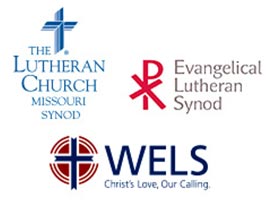
By Roger Drinnon
The Lutheran Church—Missouri Synod (LCMS), the Wisconsin Evangelical Lutheran Synod (WELS) and the Evangelical Lutheran Synod (ELS) have released a report on informal discussion among the synods that began in 2012.
“Report on the 2012-15 Meetings of ELS, LCMS, and WELS Leaders” was accepted by representatives from all three synods Dec. 2, in conjunction with a fourth meeting they held in Jacksonville, Fla. Among the representatives were LCMS President Rev. Dr. Matthew C. Harrison, WELS President Rev. Mark Schroeder and ELS President Rev. John A. Moldstad Jr.
The document serves as a mutually approved report to each synod about the status of the informal discussions and meetings held each December since 2012. The document notes that since the preliminary meeting in 2012, all three synods have adopted convention resolutions to encourage continued informal discussion. A meeting in 2013 focused on the doctrine of church and ministry. Informal talks in 2014 focused on the doctrine of church fellowship, and 2015’s discussions focused on hermeneutics (methods of biblical interpretation).
“[Nearly] 55 years after the Wisconsin Evangelical Lutheran Synod and 60 years after the Evangelical Lutheran Synod suspended fellowship with the Missouri Synod, the three synods have been engaged in informal discussion for the past three years,” said the Rev. Dr. Albert B. Collver III, director of LCMS Church Relations. “The informal discussions have resulted in the recognition that the three synods … have significant agreement in the primary areas of theology. We also recognize that a great deal of additional conversation and work must continue on areas where we do not have full agreement.”
The synods were once in fellowship as members of the Evangelical Lutheran Synodical Conference of North America (also known as the Synodical Conference). When fellowship was suspended between the ELS and the LCMS in 1955 and between WELS and the LCMS in 1961, it was understood that efforts would continue toward overcoming the differences that led to these breaks in fellowship.
An excerpt from the report jointly recognizes the challenges Christians face today and the need for confessional Lutherans to continue informal discussion, stating: “Around us in America, we see a culture that is increasingly hostile to Christianity. It is good to be in conversation with the few who are still committed to confessional Lutheranism. This is something that the LCMS especially has been trying to do around the world, bringing Lutherans together and encouraging them to be faithful to the Scriptures and the Lutheran Confessions.”
The report acknowledges that although challenges remain, participants are encouraged that these efforts will continue toward perhaps someday re-establishing fellowship among the three synods.
“It has been a joy to meet with and talk with faithful Lutherans from the WELS and ELS,” said Collver. “We pray that the Lord would continue to bless this endeavor and, Deo volente [God willing], grant a restoration of fellowship between the three synods at some point in the future.”
[button link=”https://reporter.lcms.org/2015/report-on-the-2012-15-meetings-of-els-lcms-and-wels-leaders” color=”lcms” window=”yes”]Read Report[/button]
Roger Drinnon (roger.drinnon@lcms.org) is manager of Editorial Services for LCMS Communications.
Posted Dec. 8, 2015 / Updated Dec. 17 and 18, 2015
